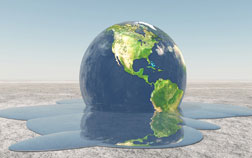Climate change is a significant and emerging threat to public health, and changes the way we must look at protecting vulnerable populations.
The most recent report of the Intergovernmental Panel on Climate Change confirmed that there is overwhelming evidence that humans are affecting the global climate, and highlighted a wide range of implications for human health. Climate variability and change cause death and disease through natural disasters, such as heatwaves, floods and droughts. In addition, many important diseases are highly sensitive to changing temperatures and precipitation. These include common vector- borne diseases such as malaria and dengue; as well as other major killers such as malnutrition and diarrhoea. Climate change already contributes to the global burden of disease, and this contribution is expected to grow in the future.
The impacts of climate on human health will not be evenly distributed around the world. Developing country populations, particularly in Small Island States, arid and high mountain zones, and in densely populated coastal areas, are considered to be particularly vulnerable.
Fortunately, much of the health risk is avoidable through existing health programmes and interventions. Concerted action to strengthen key features of health systems, and to promote healthy development choices, can enhance public health now as well as reduce vulnerability to future climate change.
WHO supports member states in protecting public health from the impacts of climate change, and provides the health-sector voice within the overall UN response to this global challenge.

